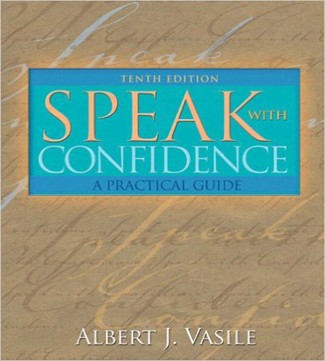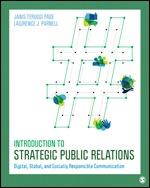Speak with Confidence A Practical Guide 10th Edition Vasile Test Bank
$35.00
Speak with Confidence A Practical Guide 10th Edition Vasile Test Bank
978-0205498864
Chapter 1 Preparing to Speak with Confidence
Multiple-Choice Questions
1 ) The ?common good? that we all share with presidents, TV news anchors and CEOs refers to
________.
A) excellent networking skills
B) the gift of oral communication
C) a belief in democracy
D) the good of the human race
Answer: B
Diff: 1 Page Ref: 3
Skill: Knowledge
2 ) Overcoming shyness will allow you to do all of the following except ________.
A) greet new people
B) be more assertive
C) socialize more
D) repress your opinions
Answer: D
Diff: 1 Page Ref: 10
Skill: Comprehension
3 ) Meeting the ?right people? will help you to ________.
A) make contact with people to advance your career
B) get the job over a more qualified person
C) save money
D) travel to exotic places
Answer: A
Diff: 2 Page Ref: 13
Skill: Knowledge
4 ) This course will help you do all the following except ________.
A) earn more respect from associates
B) be more aggressive toward others
C) become a better and more interesting person
D) be more convincing to an audience
Answer: B
Diff: 2 Page Ref: 13-14
Skill: Application
5 ) According to Philip Zimbardo, ________ percent of Americans report experiencing shyness at
times.
A) 99
B) 80
C) 50
D) 25
E) 10
Answer: B
Diff: 2 Page Ref: 10
Skill: Knowledge
6 ) Ethical behavior includes all of the following except ________.
A) distinguishing between fact and opinion in your speeches
B) avoiding plagiarism
C) being a good listener
D) excluding information that is contrary to your message
Answer: D
Diff: 2 Page Ref: 17-18
Skill: Application
7 ) A good speaker should be aware that the audience may consist of which of the following?
A) different age groups
B) different political groups
C) different ethnic groups
D) all of the above
Answer: D
Diff: 1 Page Ref: 17
Skill: Knowledge
8 ) Good listeners should do all of the following except ________.
A) prepare for a learning experience
B) concentrate on the message
C) keep an open mind
D) stay true to their own opinions
Answer: D
Diff: 2 Page Ref: 18
Skill: Application
9 ) Plagiarism is ________.
A) not ethical
B) easier today, due to the Internet
C) not giving credit where it is due
D) all of the above
Answer: D
Diff: 2 Page Ref: 20
Skill: Comprehension
10 ) Being assertive is different from being aggressive because ________.
A) assertive people can express themselves without turning people off
B) being aggressive means forcing your feelings and views on others
C) aggressive people tend to be more popular than others
D) Both A and B.
Answer: D
Diff: 2 Page Ref: 12-13
Skill: Analysis
11 ) To think about yourself in a positive manner, you might repeat all the following statements
except ________.
A) ?I?m going to be more friendly to people.?
B) ?I have a lot to offer.?
C) ?I?m a better speaker than everyone in the class.?
D) ?I am going to be more outgoing.?
Answer: C
Diff: 1 Page Ref: 10
Skill: Application
12 ) Your ability to ?sound off? or express yourself in society is important mostly because ________.
A) it is your democratic right
B) talk radio shows always need guests
C) complex issues are tough to resolve
D) people listen to the best speakers
Answer: A
Diff: 3 Page Ref: 3
Skill: Analysis
13 ) According to your textbook author, what is the essence of ethics for speakers?
A) Family background dictates your personal ethics.
B) Ethics are based on the common law.
C) Doing right is more important than knowing what is right.
D) The listener and speaker are equally responsible.
Answer: C
Diff: 3 Page Ref: 16
Skill: Comprehension
True/False Questions
1 ) More women are socialized into shyness then men.
Answer: TRUE
Diff: 1 Page Ref: 10
Skill: Knowledge
2 ) Some psychologists believe that increased use of computers, e-mail, and the Internet could
make shy people even more reclusive.
Answer: TRUE
Diff: 2 Page Ref: 11
Skill: Comprehension
3 ) Today?s world of complex issues and highly developed media calls for greater individual
assertiveness.
Answer: TRUE
Diff: 3 Page Ref: 4-6
Skill: Comprehension
4 ) The overriding purpose behind this course is to teach you how to more effectively influence
others.
Answer: FALSE
Diff: 2 Page Ref: 13-14
Skill: Comprehension
5 ) Even if you work mostly alone as a computer programmer or a librarian, you must be able to
communicate effectively with others.
Answer: TRUE
Diff: 2 Page Ref: 7
Skill: Comprehension
6 ) Research has shown that people who are shy as children are unable to become celebrities later
in life.
Answer: FALSE
Diff: 1 Page Ref: 9
Skill: Knowledge
7 ) If you don?t want to be shy, you don?t have to be.
Answer: TRUE
Diff: 2 Page Ref: 9
Skill: Knowledge
8 ) If someone says about you, ?Well – we certainly know where she stands,? it means that you
are an aggressive person.
Answer: FALSE
Diff: 2 Page Ref: 12-13
Skill: Application
9 ) Once you become a better communicator, you can use your skill to advance your career
through business and social contacts.
Answer: TRUE
Diff: 2 Page Ref: 13
Skill: Application
10 ) Anyone can become a better and more interesting person as a result of this course.
Answer: TRUE
Diff: 1 Page Ref: 13-14
Skill: Knowledge
11 ) Listening skills are important, but speaking takes more skill and talent.
Answer: FALSE
Diff: 3 Page Ref: 18
Skill: Analysis
12 ) In any speaking situation, both the speakers and the listener have equally important ethical
responsibilities.
Answer: TRUE
Diff: 2 Page Ref: 18
Skill: Comprehension
Short Answer Questions
1 ) List two things you can do to increase your self-confidence.
Diff: 1 Page Ref: 10
Skill: Synthesis
2 ) List five things this course can do for you.
Diff: 1 Page Ref: 13-14
Skill: Knowledge
3 ) List four things you can do to avoid plagiarism.
Diff: 2 Page Ref: 21
Skill: Knowledge
4 ) Discuss the concept of the ?common good? that you share with successful, famous people.
Diff: 2 Page Ref: 3
Skill: Synthesis
5 ) What does it mean to ?sound off? in today?s society? How have complex issues and an
advanced media made this job more important for all citizens?
Diff: 3 Page Ref: 3-6
Skill: Evaluation
6 ) How can effective oral communication skills be useful in a disagreement or any other negative
situation?
Diff: 2 Page Ref: 7
Skill: Synthesis
7 ) List and discuss at least three techniques for overcoming shyness.
Diff: 1 Page Ref: 10-12
Skill: Application
8 ) Describe the major differences between assertiveness and aggressiveness.
Diff: 1 Page Ref: 12-13
Skill: Knowledge
9 ) A coworker approaches you and complains, ?For some reason, I can?t seem to assert myself at
work. People don?t take me seriously, and I know it is holding me back in my career.? What do
you advise your friend to do?
Diff: 3 Page Ref: 12-13
Skill: Application
10 ) Discuss the relationship between speaking and listening. How are each important, and how
does one complement the other?
Diff: 3 Page Ref: 16-20
Skill: Synthesis
11 ) As a speaker, why is it important to strive for high ethical standards? What special ethical
responsibilities go along with speaking?
Diff: 3 Page Ref: 16-18
Skill: Evaluation
12 ) As a listener, why is it important to strive for high ethical standards? What special ethical
responsibilities go along with listening?
Diff: 3 Page Ref: 18-19
Skill: Evaluation
13 ) Discuss the issue of plagiarism from a technology standpoint. Why has this issue become more
complicated with the advent of the World Wide Web?
Diff: 2 Page Ref: 20-21
Skill: Analysis
Chapter 2 Your First Talk: I?d Like to Introduce Myself
Multiple-Choice Questions
1 ) To overcome nervousness on your first speech, do all of the following except ________.
A) draw a few deep breaths
B) walk to the front of the room with confidence
C) make remarks to audience members as you walk
D) before speaking, look around the room
Answer: C
Diff: 2 Page Ref: 38
Skill: Application
2 ) The more you know about your topic ________.
A) the more you risk being overconfident
B) the greater the chance of including too much detail in your speech
C) the better your chances of being an effective communicator
D) the less likely it is that people will listen to you
Answer: C
Diff: 1 Page Ref: 27-28
Skill: Knowledge
3 ) Using notes to speak ________.
A) is recommended
B) may confuse the speaker
C) always distracts the audience
D) will hurt your credibility
Answer: A
Diff: 1 Page Ref: 46
Skill: Knowledge
4 ) Non-verbal communication refers to all of the following except ________.
A) your posture
B) your spoken words
C) your dress
D) your eyes
Answer: B
Diff: 1 Page Ref: 42
Skill: Comprehension
5 ) Eye contact can ________.
A) distract your listeners
B) show interest and sincerity
C) show careful preparation
D) make a speaker off-balance
Answer: B
Diff: 2 Page Ref: 42-43
Skill: Comprehension
6 ) The best way to control involuntary behavior is to ________.
A) know your topic
B) rehearse many times out loud
C) realize that the nervousness will diminish after a few moments
D) all of the above
Answer: D
Diff: 1 Page Ref: 39
Skill: Knowledge
7 ) To improve gestures, you should do all of the following except ________.
A) videotape yourself
B) practice in front of a mirror
C) keep your hands in your pockets
D) pay attention to others? gestures
Answer: C
Diff: 2 Page Ref: 44
Skill: Comprehension
8 ) The introductory talk is an excellent opportunity to do all of the following except:
A) Share some of your life with your classmates
B) Learn something about the other members of your class
C) Talk at length about all of your personal interests
D) Participate in a question-and-answer session afterward
Answer: C
Diff: 2 Page Ref: 26
Skill: Comprehension
9 ) Good reasons to be nervous before a talk include all of the following but:
A) Fear of the known risks
B) Fear of the unknown
C) Fear of failure
D) Fear of rejection
Answer: A
Diff: 2 Page Ref: 36-37
Skill: Knowledge
10 ) Which of the following is most true about the use of correct English grammar?
A) It can get boring to listen to a person who uses perfect grammar.
B) A speaker can convey a negative impression by using poor grammar.
C) A bit of poor grammar won?t make a difference in a speech.
D) Good grammar says little about a person?s intelligence.
Answer: B
Diff: 2 Page Ref: 40-41
Skill: Comprehension
Be the first to review “Speak with Confidence A Practical Guide 10th Edition Vasile Test Bank” Cancel reply
Related products
Test Bank












Reviews
There are no reviews yet.